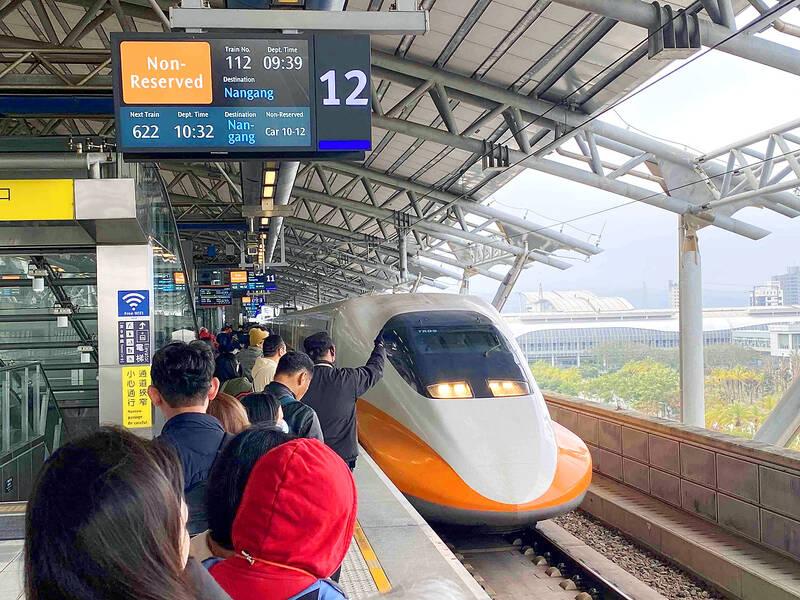Starting on Nov. 10, high-speed rail (HSR) passengers with reserved seats would be required to exchange their tickets in order to board an earlier train.
HSR passengers with reserved seats on a specific train have previously been allowed to board earlier trains on the same day and sit in non-reserved cars.
However, as this is happening increasingly often and affecting quality of travel and ticket sales, the Taiwan High-Speed Rail Corp (THSRC) today announced that it would be canceling the policy starting on Nov. 10.

Photo: Huang Hsu-lei, Taipei Times
It is one of several new measures launched by THSRC chairman Shih Che (史哲) to improve quality of service, it said.
The company also said it would start designating non-reserved seating trains during peak travel hours next year.
It originally allowed passengers with reserved seats to board earlier trains in case of a last-minute scheduling change.
However, hundreds of people are taking advantage of this policy every day, affecting ticket sales and quality of travel, the company said.
The original reserved seats are wasted and cannot be resold to passengers in need, and overall quality of travel is impacted when capacity is strained on earlier trains due to the additional passengers, it said.
Considering the quality of service and rights of all passengers, the company is canceling the policy starting on Nov. 10 and requiring passengers with reserved seats to exchange their tickets before boarding an earlier train, it said.
According to Article 17 of the THSRC Passenger Transportation Contract, tickets with reserved seats are only valid for the date, train and route specified on the ticket.
Tickets without reserved seats are valid for the date and route specified on the ticket, offering passengers flexibility to board any train that day, but without a guarantee of seating.

The Coast Guard Administration (CGA) yesterday said it had deployed patrol vessels to expel a China Coast Guard ship and a Chinese fishing boat near Pratas Island (Dongsha Island, 東沙群島) in the South China Sea. The China Coast Guard vessel was 28 nautical miles (52km) northeast of Pratas at 6:15am on Thursday, approaching the island’s restricted waters, which extend 24 nautical miles from its shoreline, the CGA’s Dongsha-Nansha Branch said in a statement. The Tainan, a 2,000-tonne cutter, was deployed by the CGA to shadow the Chinese ship, which left the area at 2:39pm on Friday, the statement said. At 6:31pm on Friday,

The Chinese People’s Liberation Army Navy’s (PLAN) third aircraft carrier, the Fujian, would pose a steep challenge to Taiwan’s ability to defend itself against a full-scale invasion, a defense expert said yesterday. Institute of National Defense and Security Research analyst Chieh Chung (揭仲) made the comment hours after the PLAN confirmed the carrier recently passed through the Taiwan Strait to conduct “scientific research tests and training missions” in the South China Sea. China has two carriers in operation — the Liaoning and the Shandong — with the Fujian undergoing sea trials. Although the PLAN needs time to train the Fujian’s air wing and

Taiwanese celebrities Hank Chen (陳漢典) and Lulu Huang (黃路梓茵) announced yesterday that they are planning to marry. Huang announced and posted photos of their engagement to her social media pages yesterday morning, joking that the pair were not just doing marketing for a new show, but “really getting married.” “We’ve decided to spend all of our future happy and hilarious moments together,” she wrote. The announcement, which was later confirmed by the talent agency they share, appeared to come as a surprise even to those around them, with veteran TV host Jacky Wu (吳宗憲) saying he was “totally taken aback” by the news. Huang,

The American Institute in Taiwan (AIT) put Taiwan in danger, Ma Ying-jeou Foundation director Hsiao Hsu-tsen (蕭旭岑) said yesterday, hours after the de facto US embassy said that Beijing had misinterpreted World War II-era documents to isolate Taiwan. The AIT’s comments harmed the Republic of China’s (ROC) national interests and contradicted a part of the “six assurances” stipulating that the US would not change its official position on Taiwan’s sovereignty, Hsiao said. The “six assurances,” which were given by then-US president Ronald Reagan to Taiwan in 1982, say that Washington would not set a date for ending arm sales to Taiwan, consult